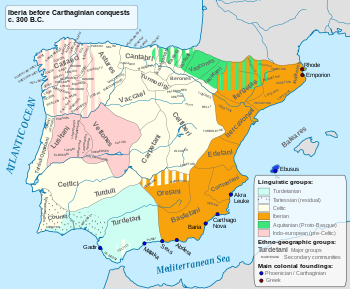
The Laietani or Laeetani were an ancient Iberian (Pre-Roman) people of the Iberian Peninsula (the Roman Hispania). They inhabited the area occupied by the city of Barcelona. One of the main thoroughfares of the city, Via Laietana, is named after the Laietani. They are believed to have spoken an Iberian language.
Name
Iberian coins, with the inscription laieśken in northeastern Iberian script, dating from the 2nd and 1st centuries BCE, are interpreted as minted by the Laietani, and bearing an endonym of that people in the Iberian language: from the Laietani or from those of Laie. A minority view takes the ś to be part of the name.[1] Conventionally, seven other types of coins have been catalogued as Laietanian,[2] but without a firm connection, as their places of minting are usually unknown.[3] In addition, the name is attested in a few inscriptions. Ancient geographers and writers that have written about the area used a greater variety of names, including Laletani/Laletanum, Lasetani and Lacetani (or at least their manuscript traditions do). Modern editors tend to emend those writings based on the epigraphic evidence, while Lacetani is connected with the other Iberian people of Iacetani.[4][5][6]
Gallery
-
Ruins of the Puig Castellar Iberian village, Santa Coloma de Gramanet
-
Inscribed lead plates from the Iberian archaeological site Penya del Moro, Sant Just Desvern
-
Vestiges of iberian archaeological site Ca n'Oliver Iberian Settlement and Museum, Cerdanyola del Vallès
See also
References
- ^ Ferrer i Jané, Joan (2012). La lengua de las leyendas monetales ibéricas. La moneda de los íberos: Ilturo y los talleres layetanos. Museu de l'Estampació de Premià de Mar. p. 34. ISBN 978-84-615-7847-4.
- ^ Villaronga, Leandre; Benages, Jaume (2022). Ancient coinage of the Iberian Peninsula = Les monedes de l'edat antiga a la Península Ibèrica : Greek, Punic, Iberian, Roman. Institut d'Estudis Catalans. p. 237ff. ISBN 978-84-9965-080-7.
- ^ Sinner, Alejandro G. (2013-01-01). "La difusión de las emisiones ibéricas layetanas". Saguntum. Retrieved 2025-01-24.
- ^ "Laeetani". Brill's New Pauly : encyclopaedia of the ancient world : Antiquity. Leiden ; Boston : Brill. 2002. p. 164. ISBN 978-90-04-12259-8.
- ^ Schulten, Adolf (1924). "Laeetani". In Pauly, August Fr; Wissowa, Georg; Kroll, Wilhelm (eds.). Paulys Realencyclopadie der classischen Altertumswissenschaft: neue Bearbeitung (in German). Vol. Bd.12 1. p. 399. ISBN 978-3-476-01044-5.
- ^ Pliny the elder. "book 3.22". Natural history. Vol. 2. Translated by Rackham, Harris. W. Heinemann, and "book 14.71". Natural history. Vol. 4.
- Ángel Montenegro et alii, Historia de España 2 - colonizaciones y formación de los pueblos prerromanos (1200-218 a.C), Editorial Gredos, Madrid (1989) ISBN 84-249-1386-8
External links
 Smith, William, ed. (1854–1857). "LAEAETA´NI". Dictionary of Greek and Roman Geography. London: John Murray.
Smith, William, ed. (1854–1857). "LAEAETA´NI". Dictionary of Greek and Roman Geography. London: John Murray.- Detailed map of the Pre-Roman Peoples of Iberia (around 200 BC)

















